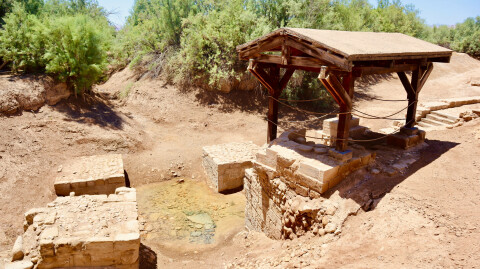TLDR: Paul, Mark, Matthew/Luke, and John give us four different answers about the question, “When did Jesus of Nazareth become the Messiah?” Understanding their answers will help us understand their books. Please read on!
Robin Williams used to say that whenever you gather twelve Episcopalians in a room, you get twenty different answers to the same theological question. This seems to be the case as well for certain questions in Scripture. I want to share in this blog some of the research I did for my sermon this week, as I will only be preaching at one of the three English services. The question I want to answer is this: When did Jesus of Nazareth become the Son of God, Messiah, Savior? We Christians believe that Jesus of Nazareth fulfilled the messianic promises of the prophets and that he was the descendant of David promised during and after the Babylonian Exile. But, at what point did God decide to send his Son into the world to become the awaited Messiah?
On the surface this is a silly question, but when you analyze the Biblical record you realize that this was an important question for the authors of the New Testament. There are at least four answers to this question. Let me start from the earliest to the last answer. At around the year 56 (26 or so years after the death and resurrection of Christ) Paul states in Romans 1:4, “(Jesus) was declared to be Son of God with power according to the spirit of holiness by resurrection from the dead, Jesus Christ our Lord.” For Paul, it is at the resurrection that Jesus becomes the Messiah and Savior of the world. Perhaps, it is for this reason that Paul doesn’t give us any information about Jesus’ birth, infancy, or early ministry. To him, the events that transpired at the cross and, most especially, the resurrection, are at the center of the Gospel of Jesus Christ.
Approximately 14 years later, around the year 70, the Evangelist Mark gives us a different answer. For him Jesus becomes the Son of God or Messiah at baptism. At least, it is at baptism that God himself declares Jesus to be his Son. Mark says the following at 1:10-11, “And just as he was coming up out of the water, he saw the heavens torn apart and the Spirit descending like a dove on him. And a voice came from heaven, ‘You are my Son, the Beloved; with you I am well pleased.’” Perhaps this is the reason why Mark does not give us an infancy narrative. Baptism is the point at which Jesus’ identity as Messiah is most fully understood. The entire narrative of Mark flows from this experience of Baptism, where Jesus is filled with the Holy Spirit and thrust into mission for and in the world.
Luke and Matthew use different source materials but arrive at the same place. They both affirm that Jesus became Savior and Messiah at the time of conception. It is through divine intervention in the life of a young virgin that the birth of the Messiah takes place. In fact, this is what the angel tells Mary in Luke 1:32, “He will be great, and will be called the Son of the Most High, and the Lord God will give to him the throne of his ancestor David.” The identity of Jesus as Messiah is revealed by the angel to Mary in Luke and to Joseph in Matthew. In both of these cases the angel says his name is to be Jesus, which means Savior. The vocation of the child is none other than to be Messiah, Savior, God-with-us or Emmanuel, as many will call him. The Savior will be none other than God’s own presence among us.
Approximately 10 years after Luke and Matthew, the Evangelist John gives us the last answer to the question, “When did Jesus become the Son of God or Messiah?” In a way this is what John says, “It wasn’t at the resurrection, it wasn’t at the baptism, and it wasn’t at conception. He was in the beginning with God (1:2). “In the beginning was the Word, and the Word was with God, and the Word was God (1:1).” Through the Messiah all things came into being. This is John’s answer. The Messiah has always been with God because he is God. Then, at the right time, he took on flesh, being born of a virgin, becoming one of us to save us from within creation.
What do we make of these four different answers? Do we choose one as better than another? Do we form four different churches in competition with each other around this issue? No, we accept all answers as representing the author’s particular faith experience and theological concerns. We know that Mark is the first Gospel and that his community has had to deal with the after-effect of Nero’s burning one third of Rome and blaming this on the Christians. Mark gives us a “Gospel of Breathless Delight,” where the narrative moves along as a breathless child recounting the events of the day to his mother or father. “First we did this, then we did this, then, suddenly, we did this…” Mark wants his hearers to know that through baptism they share in the same vocation and mission as the Messiah, and therefore, should not be surprised by their persecution. As Messiah was persecuted, they are being persecuted. As Messiah remained faithful to God’s plan to the end, they must remain faithful even at the cost of death. Baptism builds a link between Jesus and the Church, and it is the point at which our identity as followers of Jesus is fully established. Therefore, we are called to endurance, unwavering commitment, and humility.
Paul did not have the luxury of being educated or trained by Jesus of Nazareth. He came to faith in a post-resurrection experience, and the event of his supernatural conversion was so important to him that he describes his ministry as a revelation from the risen Christ itself, “For I want you to know, brothers and sisters, that the gospel that was proclaimed by me is not of human origin; for I did not receive it from a human source, nor was I taught it, but I received it through a revelation of Jesus Christ.” (Galatians 1:11). The Damascus experience is so powerful that he recounted the event in full detail in three different places in the New Testament (Acts 9:3–9, Acts 22:6-16, and Acts 26:12-18.) For Paul it is the Resurrection of the Son of Man that becomes the point at which Jesus of Nazareth becomes the Savior of the world.
Matthew and Luke have similar concerns in mind. Matthew wants to show that Jesus fulfils the Jewish prophesies. He is the one announced by the Scriptures. For this reason, he gives a traditional genealogy, similar to the genealogies we find in the Old Testament. By building a connection to the ancestors, Matthew wants the reader to know that Jesus fulfills the Jewish Scriptures and that his birth of human parents had been announced for many centuries and through various oral and written traditions. This makes Matthew the most Jewish Gospel in our Bible. Luke, on the other hand wants to present an orderly, historical, and easy-to-understand account of the life of Jesus for a Gentile audience. Jesus comes to seek the lost, as was God’s intent from the beginning. God has always had the conversion of the Gentiles in his mind. Through Jesus, God accomplished this mission and brought into “The Way” those who did not belong to “The Way.” His historical and orderly account starts at conception and ends at resurrection in a story with a very clear beginning and end.
John is not as concerned with history as he is with theology. He doesn’t ask the question, “What happened?” Or even, “How did it happen?” His question is, “Why did it happen?” This is a more spiritual retelling of the Messiah’s story, which begins not on earth, but in God’s own presence before creation started. For John, the Christ has always existed because the Christ is God. At some point, “The Word became flesh and chose to dwell among us.” John wants to establish Jesus’ divinity from the first line of his Gospel. This is the reason why he gives us a story that begins in the very same place we want our story to end: In God’s own presence.
Five different witnesses give us their own very unique accounts of what is for them and for us the most important event in the history of the universe. God himself chooses to dwell in human form through an eternal Son (John,) announced by the prophets for centuries (Matthew,) who is vested with a special identity as Messiah at his baptism (Mark,) and who means good news both for Jews and Gentiles (Luke.) This boy will one day give up his life on a cross for the salvation of the human race, but God will vindicate him through resurrection, making him the Messiah, Son of David, Savior of the world (Paul.)
Regardless of how you answer the question above, I pray that you will join me in celebrating the mystery of Jesus’ birth this coming week. All we really need to know is that Jesus is good news for the world and that he loves us in indescribable ways,
May he dwell in your hearts this Christmas,
Fr. Roman+





